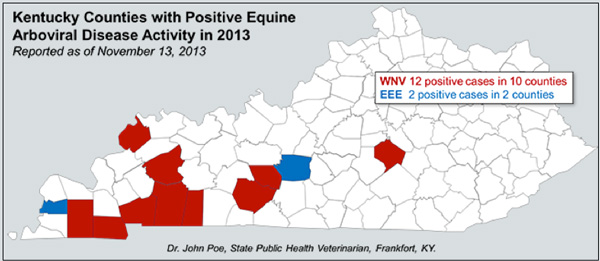
West Nile virus (WNV) causes disease in humans, horses and birds. It is a mosquito-borne virus that first appeared in the United States on the East Coast in 1999. Many horses were infected and died during the following years, and WNV is now considered endemic in the U.S.
Infected birds develop a high viremia and serve as the source of virus to infect mosquitoes. The incubation period in horses is 7-10 days and clinical signs in horses consist of low-grade fever, anorexia and lethargy progressing to neurologic signs that may appear suddenly and worsen over the ensuing days. Fortunately, once infected, horses do not pose a risk to other horses, people, or birds due to low virus levels.
Since the appearance of WNV, cases have continued to be diagnosed in horses in the United States and Kentucky. As of November, Kentucky officials reported 12 cases of WNV for 2013. These cases occurred in 10 Kentucky counties. None of the 12 horses were vaccinated against WNV. Seven were Quarter Horses, two were Standardbreds, and the remaining were a Paint Horse, a Percheron cross, and a Rocky Mountain Horse. Ten of the horses survived, and two were euthanized. In 2012, 13 cases of WNV were reported versus one case in 2011. The 2012 cases were centered in Central Kentucky while in 2013 the cases were in Western Kentucky.
Eastern equine encephalomyelitis (EEE) is uncommon in Kentucky. This viral disease is also mosquito transmitted and is characterized by clinical signs similar to those seen with WNV. Eastern equine encephalomyelitis is considered to have a mortality rate approaching 90%. In 2013 in Kentucky, two cases of EEE were reported. One case was in a 10-year-old Tennessee Walking Horse and the other in a 17-year-old Quarter Horse. Neither had been vaccinated against EEE, and both horses died as a result of disease.
The American Association of Equine Practitioners includes WNV and EEE in their list of core vaccinations for horses. The other core vaccinations are Western equine encephalomyelitis, tetanus and rabies.
Additional information can be found at http:// www.kyagr.com/statevet/equine-infectious-diseases.html#west.


